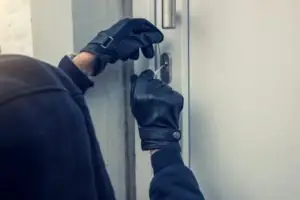
In the State of Florida, if you are found to be in possession of burglary tools, you could be convicted of a third-degree felony and face serious penalties such as a $5,000 fine and five years in prison. Some people think that if they have a strong defense, they can face these charges alone. But in truth, to have a chance of having your charges reduced or dismissed, you will need the help of a qualified Tampa criminal defense attorney.
If you have been arrested for, or are under suspicion for, the possession of burglary tools in Tampa, FL., you will be about to face an aggressive prosecution. So, it is in your best interest to seek legal representation straight away. Our criminal defense team at The Law Place has a combined experience of 75 years. We work tirelessly to defend our clients’ rights when they have been accused of serious felony charges, such as this, and we can put forward an aggressive defense on your behalf.
For a free consultation, call us today at (941) 444-4444; we are available 24 hours a day, 7 days a week.
What the Law in Florida Says About Burglary Tools Possession
The crime of possession of burglary tools is defined under Florida Statute 810.06. It states that it is against the law for a person to have any tool, machine, or implement in their possession with the intent to use the tool to commit (or allow others to commit) a burglary or to trespass.
This statute goes further by describing and clearly prohibiting attempted burglary or trespassing. In other words, it criminalizes a person’s attempt to commit a burglary whilst in possession of tools or any other device that could be used to do so, even if the attempt was unsuccessful.

Proof Required in a Possession of Burglary Tools Case
In a possession of burglary tools case, the prosecution must establish three elements to prove that the defendant is guilty beyond a reasonable doubt;
- The defendant in question had the intention to trespass or commit a burglary.
- The defendant had a tool, machine, or implement in their possession that they intended to use (or allow to be used) to commit a burglary or to trespass.
- The defendant committed an explicit act toward the completion of the alleged burglary or trespass.
The prosecution must also establish that the object in question constitutes a burglary tool and that the defendant used this object (or intended to use it) for a burglary or to trespass. If the tool is tied to another crime such as a previous theft, this is not enough proof to establish guilt for the charges presented, and conviction would not be sustained.
 We’re here to serve you. Our phones are open 24 hours a day.
We’re here to serve you. Our phones are open 24 hours a day.
What Constitutes as a Burglary?
Under Florida Statute 810.02, burglary is defined as the entering of a dwelling, structure, or conveyance with the intent of committing an offense inside. This includes situations where:
- A person has entered stealthily with the intent to commit an offense inside.
- The person remains after the permission to remain has been withdrawn, with the intent to commit an offense inside.
- The person commits or attempts to commit a forcible felony, such as manslaughter, murder, robbery, sexual assault, aggravated assault, robbery, and any other listed under Florida Statute 776.08. Charges might be increased to a second-degree felony or a first-degree felony if other serious crimes took place.
The statute does not include instances where a structure or conveyance was open to the general public, or instances where the alleged offender is invited or licensed to enter the premises or is invited to remain on the premises.
 We’re Florida’s top litigation team with over 75 years of combined experience
We’re Florida’s top litigation team with over 75 years of combined experience
What Constitutes as a Burglary Tool?
Any tool, device, or any other implement can be classed as a burglary tool if there is substantial proof that they were used or were intended to be used to commit a burglary or to trespass.
A common household object such as bolt cutters and screwdrivers are common examples of tools that have duel-use. If the prosecution can show that there was intent to use these items in a burglary, they will be classed as burglary tools. However, as discussed in more detail below, showing someone’s intent to use an object as a burglary tool is very difficult.
Under Florida Statute 810.06, personal apparel items are not included under the umbrella of “tool, machine or implement.” This includes items such as gloves, even though they are commonly used in burglaries to avoid fingerprint detection. Items such as this, under the statute, are not deemed to facilitate the act of breaking and entering in the same way that another tool would.
 From the initial call to updates on your case status, we are here to get you answers.
From the initial call to updates on your case status, we are here to get you answers.
Penalties for Possession of Burglary Tools
In the state of Florida, the crime of possession of burglary tools is a third-degree felony. If convicted, you may face one or a combination of the following penalties:
- Five years in prison.
- Five years of probation.
- A fine of up to $5,000.
Charges might be increased to a second-degree felony or a first-degree felony if other serious crimes took place during the burglary.
It is in your best interest to avoid third-degree felony charges. If you are convicted, your felony charges will have serious long-term consequences. An experienced defense attorney can fight to have your charges reduced or even dismissed.
The Long-Term Implications of Felony Charges
A felony conviction will haunt you for many years to come, long after your fine has been paid, or your prison sentence has been served. Many jobs require that you indicate if you have been convicted of a felony. In certain areas of work, such as childcare, you would be dismissed straight away. You would lose the right to vote, your ability to own a firearm, and most loan companies and landlords would reject your application. This is why you desperately need a criminal defense attorney’s support if you are facing felony charges in Tampa.
Defenses Available in a Tampa Possession of Burglary Tools Case
If you have been arrested for the crime of possession of burglary tools in Tampa, FL., there are many defenses available to you. No plea should ever be put forward without speaking to an experienced Tampa criminal defense attorney.
Some of the most common defenses of this crime in Tampa are:
No Proof of Intent
A required element of a conviction for this crime is proof of intention. It must be shown that the defendant had the intent to trespass or commit burglary whilst in possession of burglary tools. It must also be shown that the defendant had the intention to use the tools that were in his or her possession at the time. This creates a “dual intent burden,” which is more difficult to prove by the state attorney. This means that if just one of these elements is not met, there is no proof of intent, and you have a strong case for dismissal.
Burglary Tools Not in the Possession of the Defendant
If the alleged burglary tool was not in your physical possession at the time of the offense, for example, it was in your car or another location, it is possible that the prosecutor would be unable to prove your intention to use them in order to commit the burglary.
Lack of Evidence That the Tools Were Used
If there is little or no proof that the defendant ever used the tools during an attempted burglary or trespass, it will most likely be very difficult to sufficiently prove an intent to use them. Cases where defendants have been observed using burglary tools by law enforcement are much more straightforward than those where intent must be established.
No Overt Act
Under the conditions set out by Florida Statute 810.06, a person cannot be convicted of the crime of possession of burglary tools unless the defendant physically engaged in the act of burglary or causes some overt act towards the commission of it. Charges cannot be sustained in a case where they were merely talking or thinking about doing it.
Circumstantial Evidence
Evidence of a defendant’s intentions is necessary to achieve a conviction of this crime. If there is any suggestion of innocence, the prosecution must show that this is inconsistent with the evidence. If the state is unable to do so, the accused party will be acquitted.
Without the knowledge and experience of a qualified attorney, it is not possible to present a solid defense case. Call The Law Place now, and our team can begin to build a factual and legal defense on your behalf.
Statute of Limitations in a Tampa Possession of Burglary Tools Case
Florida Statute 775.15 rules that there are limitations on the length of time the state has to raise charges for a crime. The law dictates that the “prosecution must commence in a timely manner.” Therefore, if a certain amount of time has passed since the alleged offense, it may not be possible to take it to court. A statute of limitations of three years applies to all third-degree felony charges. Although, under certain circumstances, this could be extended.
How Soon Should You Hire an Attorney in Tampa?
It is common for defendants to assume that they can convince law enforcement of their innocence without an attorney’s help, but often they just make things worse. All residents of Florida, and the United States, in general, have the right to request a lawyer before they are obligated to answer questions from law enforcement. Therefore, it is important that you should hire a qualified attorney straight away to avoid facing third-degree felony charges alone.
An experienced law firm will start collecting evidence from the alleged burglary immediately before it is lost or destroyed. They can also request and review police reports relating to your case. With this evidence, your attorney can get a head start on putting together a comprehensive and aggressive defense. They will also research case statutes and precedents and prepare to cross-examine any witnesses at your trial.
The best thing you can do if you have been accused of a serious crime is to speak to a criminal defense lawyer as soon as you are able to. Our attorneys at The Law Place can take on your stresses and work to have you acquitted of your charges.
Call The Law Place Today
If you have been charged with the crime of possession of burglary tools in Tampa, FL., the help of an attorney is essential.
Unlike other law firms in Florida, at The Law Place, we work as a team so you can benefit from our wealth of knowledge and experience in fighting criminal charges.
Call us today at (941) 444-4444 for a free consultation. We are available 24 hours a day, 7 days a week.





